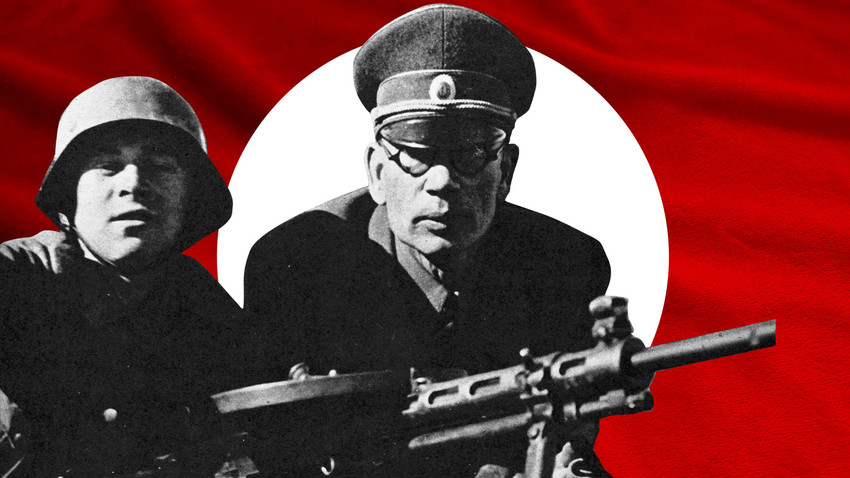sillygoose
Well-known member
What if Hitler had been willing to let Vlassov form a Russian Liberation Army and use them in combat? Apparently IOTL the reason why he wasn't allowed to do so until the end of the war when it was too late was because of Soviet disinformation via the Klatt Bureau that convinced Hitler Vlassov was double dealing with the Soviets and not to be trusted. I'm not 100% sure that is true, but that is a claim I've come across about the subject. Let's run with that and say that for whatever reason this disinformation is not believed and Hitler let's Vlassov form a 50,000 man corps (a test run for the formation of a larger force) in 1942 for use in 1943; that was historically what they were able to form by 1945:

 weaponsandwarfare.com
weaponsandwarfare.com
5 divisions had been intended, but time and equipment were short in 1944. Here if successful in combat there would be the potential to form all 5 divisions as intended in 1943.
It seems the above quote is a bit incorrect though, as the divisions were not actually motorized, but they were quite large at 18,000 men each:
 en.wikipedia.org
en.wikipedia.org
For the sake of argument let's assume they are ready to go in time for Operation Citadel and due to the shortage of infantry with Model's 9th army the KONR army is subordinated to it and used as a 'shock' army to breach Soviet lines. From what I could find this would represent at least a 20% increase in the total strength of the northern pincer of Citadel, but would actually represent an increase of ~30% for 9th army as their attack divisions were all understrength and out of the roughly 230,000 men in the 9th army only 75,000 were combat troops. The full strength KONR corps would add something a bit above 20,000 combat troops.
I have my theories about what would happen, but I'd like to know what the community thinks. How would they do in combat, how would they influence the offensive at Kursk, and what wider impact would they have on the Eastern Front politically speaking and in terms of the desertion rates of the Soviet army (which IOTL increased even in 1943 as a result of ROA activity)?

ROA in Czechoslovakia May 1945
By the middle of 1944, Vlassov’s formation, the Russkaia Osvoboditelnaia Armiia (ROA – the Russian Army of Liberation) was not an army in the sense of a military organization. Units that bore its n…
 weaponsandwarfare.com
weaponsandwarfare.com
The KONR Army had begun to form in November 1944, accompanied by shortages of arms and equipment. As a result of the deteriorating military situation in the East, the five divisions were reduced to two. Despite his difficulties, Vlassov formed an army headquarters, two motorized divisions, one reserve brigade, an engineer battalion and support units – a total strength of 50,000 men. On 28 January 1945, he officially took command of the army.
5 divisions had been intended, but time and equipment were short in 1944. Here if successful in combat there would be the potential to form all 5 divisions as intended in 1943.
It seems the above quote is a bit incorrect though, as the divisions were not actually motorized, but they were quite large at 18,000 men each:
600th Infantry Division (Wehrmacht) - Wikipedia
 en.wikipedia.org
en.wikipedia.org
Here let's assume they get a bunch of captured Soviet equipment from artillery to SP guns to tanks since there was so much of it and the Russian troops would be more familiar with it anyway.At full strength, the division had 18,000 men and was equipped with, among other things, a number of T-34 tanks, Jagdpanzer 38(t) tank hunters, a few armored vehicles and various types of artillery guns.
For the sake of argument let's assume they are ready to go in time for Operation Citadel and due to the shortage of infantry with Model's 9th army the KONR army is subordinated to it and used as a 'shock' army to breach Soviet lines. From what I could find this would represent at least a 20% increase in the total strength of the northern pincer of Citadel, but would actually represent an increase of ~30% for 9th army as their attack divisions were all understrength and out of the roughly 230,000 men in the 9th army only 75,000 were combat troops. The full strength KONR corps would add something a bit above 20,000 combat troops.
I have my theories about what would happen, but I'd like to know what the community thinks. How would they do in combat, how would they influence the offensive at Kursk, and what wider impact would they have on the Eastern Front politically speaking and in terms of the desertion rates of the Soviet army (which IOTL increased even in 1943 as a result of ROA activity)?
Last edited:







